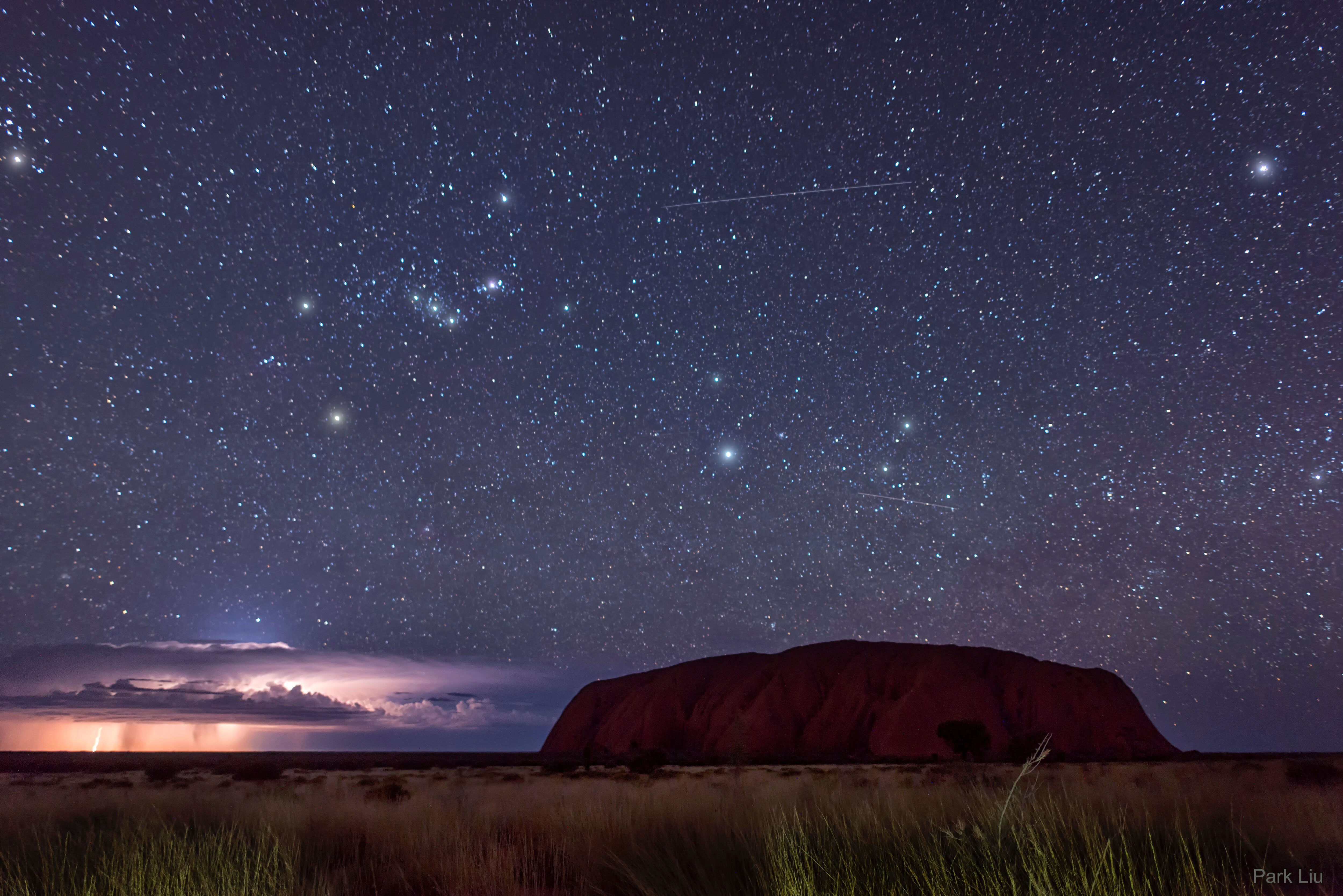11. May 2021
Tī Uluru 天頂 ê 爍爁 kah 獵戶座

探索宇宙1!逐工會揀一幅無仝款 ê 影像抑是相片,𤆬你熟似咱這个迷人 ê 宇宙,閣有專業天文學者2為你3解說4。
- 原始文章:Lightning and Orion Beyond Uluru
- 影像來源 kah 版權:Park Liu
- 台文翻譯:An-Li Tsai (NCU)
[漢羅] Tī Uluru 天頂 ê 爍爁 kah 獵戶座
Tī Uluru 後壁是發生啥物代誌咧? Uluru 是 聯合國世界遺址,是 tī 澳洲 中部足特別 ê 山。 伊有 350 公尺懸,是 tī 平地雄雄生出來 ê。 Uluru ê 成份是 沙岩。 伊是 tī 過去 3 億年 ê 時間內底,較軟 ê 岩石去予侵蝕 ê 時陣 沓沓仔形成 ê。 這張影像 ê 背景是 tī 5 月中翕 ê,看會著一陣雷公雨。 Tī Uluru kah 雷公雨 後斗閣較遠彼搭,是 天星滿滿是 ê 夜空,閣看會著明顯 ê 獵戶座。 Uluru 區 自 22,000 年前 to̍h 有人蹛矣! 遐 ê 原住民 長久以來攏認為,這个 現代星座獵戶座 ê 恆星 若是出現 tī 夜空,彼个有 爍爁風暴 ê 熱天 to̍h 隨欲來矣。
[POJ] Tī Uluru thiⁿ-téng ê sih-nà kah La̍h-hō͘-chō
Tī Uluru āu-piah sī hoat-seng siáⁿ-mih tāi-chì leh? Uluru sī Liân-ha̍p-kok Sè-kài-ûi-chí, sī tī Ò-chiu tiong-pō͘ chiok te̍k-pia̍t ê soaⁿ. I ū saⁿ-pah-gō͘-cha̍p kong-chhioh koân, sī tī pêⁿ-tē hiông-hiông seng--chhut-lâi-ê. Uluru ê sêng-hūn sī soa-giâm. I sī tī kòe-khì saⁿ-ek nî ê sî-kan lāi-té, khah nńg ê giâm-chio̍h khì hō͘ chhim-sit ê sî-chūn tau̍h-tau̍h-á hêng-sêng ê. Chit-thiuⁿ iáⁿ-siōng ê pōe-kéng sī tī gō͘ goe̍h tiong hip--ê, khòaⁿ-ē-tio̍h chi̍t-chūn lûi-kong-hō͘. Tī Uluru kah lûi-kong-hō͘ āu-táu koh khah hn̄g hit-tah, sī thiⁿ-chhiⁿ boán-boán sī ê iā-khong, koh khòaⁿ-ē-tio̍h bêng-hián ê La̍h-hō͘-chō. Uluru khu chū nn̄g-bān-nn̄g-chheng nî-chêng to̍h ū-lâng tòa--ah! Hia ê goân-chū-bîn tn̂g-kú-í-lâi lóng jīn-ûi, chit-ê hiān-tāi seng-chō La̍h-hō͘-chō ê hêng-chhiⁿ nā-sī chhut-hiān tī iā-khong, hit-ê ū sih-nà hong-pō ê joa̍h-thiⁿ to̍h sûi beh lâi--ah.
[KIP] Tī Uluru thinn-tíng ê sih-nà kah La̍h-hōo-tsō
Tī Uluru āu-piah sī huat-sing siánn-mih tāi-tsì leh? Uluru sī Liân-ha̍p-kok Sè-kài-uî-tsí, sī tī Ò-tsiu tiong-pōo tsiok ti̍k-pia̍t ê suann. I ū sann-pah-gōo-tsa̍p kong-tshioh kuân, sī tī pênn-tē hiông-hiông sing--tshut-lâi-ê. Uluru ê sîng-hūn sī sua-giâm. I sī tī kuè-khì sann-ik nî ê sî-kan lāi-té, khah nńg ê giâm-tsio̍h khì hōo tshim-sit ê sî-tsūn ta̍uh-ta̍uh-á hîng-sîng ê. Tsit-thiunn iánn-siōng ê puē-kíng sī tī gōo gue̍h tiong hip--ê, khuànn-ē-tio̍h tsi̍t-tsūn luî-kong-hōo. Tī Uluru kah luî-kong-hōo āu-táu koh khah hn̄g hit-tah, sī thinn-tshinn buán-buán sī ê iā-khong, koh khuànn-ē-tio̍h bîng-hián ê La̍h-hōo-tsō. Uluru khu tsū nn̄g-bān-nn̄g-tshing nî-tsîng to̍h ū-lâng tuà--ah! Hia ê guân-tsū-bîn tn̂g-kú-í-lâi lóng jīn-uî, tsit-ê hiān-tāi sing-tsō La̍h-hōo-tsō ê hîng-tshinn nā-sī tshut-hiān tī iā-khong, hit-ê ū sih-nà hong-pō ê jua̍h-thinn to̍h suî beh lâi--ah.
[English] Lightning and Orion Beyond Uluru
What's happening behind Uluru? A United Nations World Heritage Site, Uluru is an extraordinary 350-meter high mountain in central Australia that rises sharply from nearly flat surroundings. Composed of sandstone, Uluru has slowly formed over the past 300 million years as softer rock eroded away. In the background of the featured image taken in mid-May, a raging thunderstorm is visible. Far behind both Uluru and the thunderstorm is a star-filled sky highlighted by the constellation of Orion. The Uluru region has been a home to humans for over 22,000 years. Local indigenous people have long noted that when the stars that compose the modern constellation of Orion first appear in the night sky, a hot season involving lightning storms will soon be arriving.
詞彙學習
| 漢羅 | POJ | KIP | 華語 | English |
|---|---|---|---|---|
| 爍爁 | sih-nah | sih-nah | 閃電 | lightning |
| 獵戶座 | La̍h-hō͘-chō | La̍h-hōo-tsō | 獵戶座 | Orion |
| 聯合國世界遺址 | Liân-ha̍p-kok Sè-kài-ûi-chí | Liân-ha̍p-kok Sè-kài-uî-tsí | 聯合國世界遺址 | United Nations World Heritage Site |
| 沙岩 | soa-giâm | sua-giâm | 沙岩 | sandstone |
| 侵蝕 | chhim-sit | tshim-sit | 侵蝕 | erode |
| 雷公雨 | lûi-kong-hō͘ | lûi-kong-hōo | 雷雨 | thunderstorm |
| 風暴 | hong-pō | hong-pō | 風暴 | storm |
| 原住民 | goân-chū-bîn | guân-tsū-bîn | 原住民 | indigenous people |